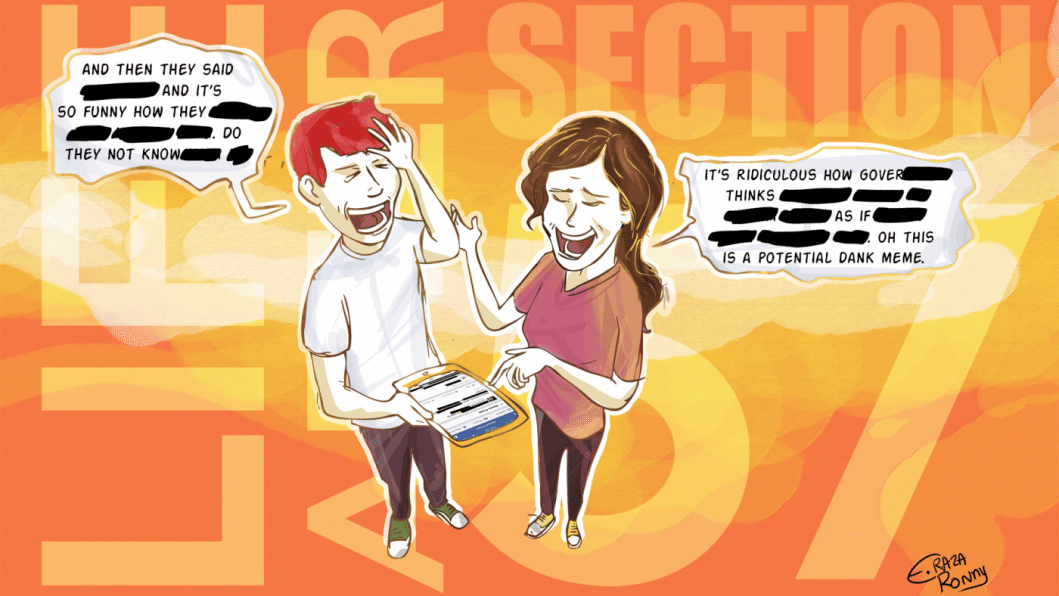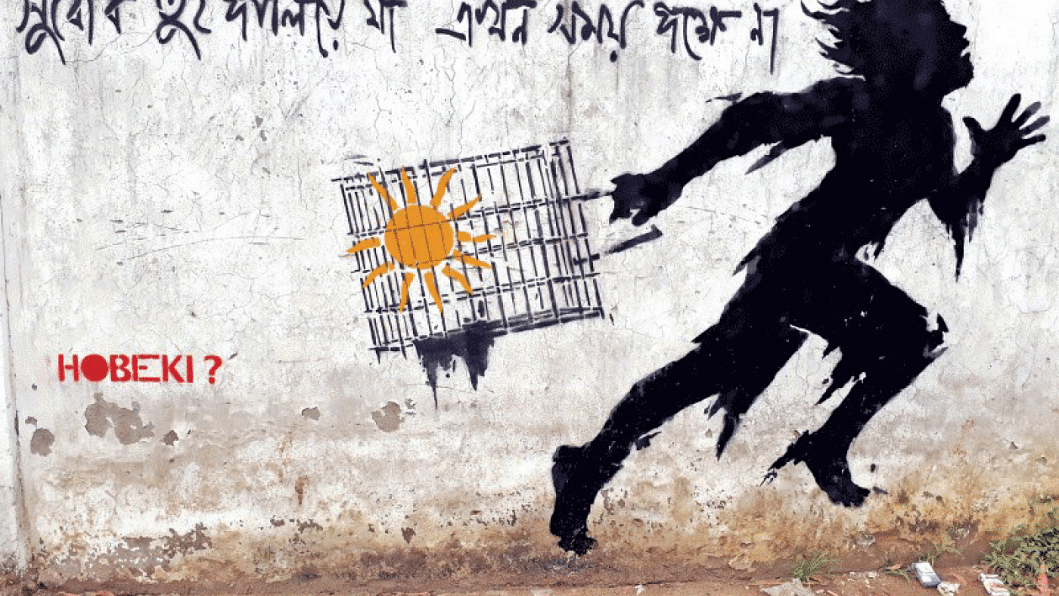A loyalist's guide to Section 57

In the world of graffiti, there are artworks that promote good vibes and positivity, and then there are those that promote hatred. But on the walls that stretched from the capital's Agargaon borough to Shishu Mela, a different kind of graffiti can be noticed. Subodh, the subject of this somewhat ambiguous artwork, is seen sprinting down the street, holding a cage, with a sun trapped inside it.
The accompanying text urges him to run, because "time is not in [his] favour."
Who is Subodh? Who or what is he running from? These are questions left to the imagination of the passers-by, but one particular explanation that sits well with the younger demographic is: Subodh is a young dissident who refuses to accept things as they are, and is running because his refusal—or defiance—makes him vulnerable. But what if Subodh didn't have to run away? What if he could find a way around all his grievances and learn to live and prosper?
Subodh's character particularly resonates with those journalists and activists who refuse to accept things as they are, and are vocal opponents of a system designed to stifle opposition and tamp down diversity of opinion. It does so using Section 57 of the Information and Communication Technology (ICT) Act, they say, and other laws with similarly vague and broadly-worded clauses.
In their defence, the activists cite a report that says that a total of 391 cases were filed under the ICT Act in the first six months of 2017. Seventy-nine of them were filed in June alone, mostly under Section 57.
So, if you're one of the more assertive denizens of our cyberspace and are worried about the likely consequences of your social media activities, here's a guide to Section 57 and how to dodge prosecution.
First of all, stop deliberating. This might take some getting used to, but it's worth it. The fact is, the more you deliberate, research and question, the further away you are from having your peace of mind. Section 57 is not for the unthinking mortals. So stop thinking. May I add, as an aside, that it's also the safest thing to do?
"Subodh's character particularly resonates with those journalists and activists who refuse to accept things as they are, and are vocal opponents of a system designed to stifle opposition and tamp down diversity of opinion. It does that using Section 57 of the Information Communication Technology (ICT) Act, they say, and other laws with similarly vague and broadly-worded clauses.
Secondly, and this is very important, have faith in the brains behind Section 57. These are the brightest brains in this country and they have blessings from some of the most powerful people this society has ever produced. A holy matrimony of brain and muscle resulting in the most useful legal document ever to be drawn up. The doubters shall remain in torment, but the believers, well, let's unspool point-by-point what virtues await the believers.
Section 57, first and foremost, teaches you the beauty of belief. As Khalil Gibran said, "Doubt is a pain too lonely to know that faith is his twin brother." An absolute faith in Section 57 can bring you peace and give you a good night's sleep, and not to mention, keep you on the right side of the bars.
Section 57 teaches you the virtue of silence. You keep your eyes closed, your mouth shut, and your nose and ears covered—and you will have that precious moment of quiet, undisturbed introspection in the gnawing sameness of your social media routine. A silence otherwise lost to reactive senses.
Your allegiance to Section 57 will also make you a proud, obedient, law-abiding citizen.
Now that we know that Section 57 is actually for our own good, it's time you adapted yourself to a more—how can I put it?—"healthy" code of conduct. Which means, from now on, you will stop writing about politics and public affairs and everything in between.
If it's any consolation, your opinion doesn't really matter. Despite your misgivings and grave predictions through the years about its future, Bangladesh didn't come crashing down—quite the contrary—it has registered impressive growth in almost all sectors. The brave soldiers at the Ministry of Planning and Bangladesh Bureau of Statistics can vouch for that. Do people's sufferings bother you? You should learn to see beyond that and focus on the greater good. Have faith, if nothing else works for you.

The next wise thing would be to stop "sharing." The dead goat will rot in a day or two but a Section 57 scar may last a lifetime. But if you must, share or write posts that do not contain "false information," "obscene material," "defamatory statements," "statements hurting religious sentiments," and "expressions that are likely to cause deterioration of law and order" or "tarnish the image of the state or an individual."
Confused? Well, Section 57 can be a little vague on details but believers, real believers, know that these conditions are actually an exercise in cleansing your negative thoughts. In any case, you'll learn the art of self-censorship, which is not such a bad idea. Self-censorship can lead to invaluable artistic expressions. Ask Anisul Hoque if it is not true.
These conditions may also work as safeguards against the release of your basest instincts. Imagine the world, for example, descending into chaos because of one man sending lewd emojis to the wife of another!
And always remember to say nice things about the nice people in sleeveless black coat. If William Congreve were alive today, and in present-day Bangladesh, he would've said: "Hell hath no fury like a man in black coat scorned." So, yes, you're safe as long as they're happy. That being said, the desire to criticise seems to be hardwired into our brains. We can't always control it. So the next time you find your fingers itching to write a damning post on someone, try Donald Trump—he doesn't mind really.
But why spread negativity when you can light up someone's world with your erudite opinion on the wonderful topics such as khichuri on a rainy day, Apu Biswas' fitness, the art of bunking office, or India's cow ministry? You can also write about fast-food takeaways, cricket, automobiles, the 19 classic types of selfies …
The more I think about it, the more I grow fond of Section 57. Sometimes I feel as if my brain is not well fitted to fully grasp the wisdom behind it; other times I feel like we're not doing enough to spread its universal messages. Maybe we need a Newspeak of our own to purge our brains of bad thoughts. Maybe we need to introduce a chapter on Section 57 in our school curricula so that children can grow up appreciating its values.
The children will also have learnt an important lesson early in their life: that freedom of speech doesn't necessarily have to include the freedom to question, disagree, debate, or criticise. That it means only the freedom to speak as directed. And who better to direct it than the wise promulgators of Section 57?
Subodh didn't have to run if he had learned these lessons early in his life. He could train his mind to stop questioning, ignore whatever was going on around, and turn time back in his favour.
Badiuzzaman Bay is a member of the editorial team at The Daily Star.
E-mail: [email protected]










Comments